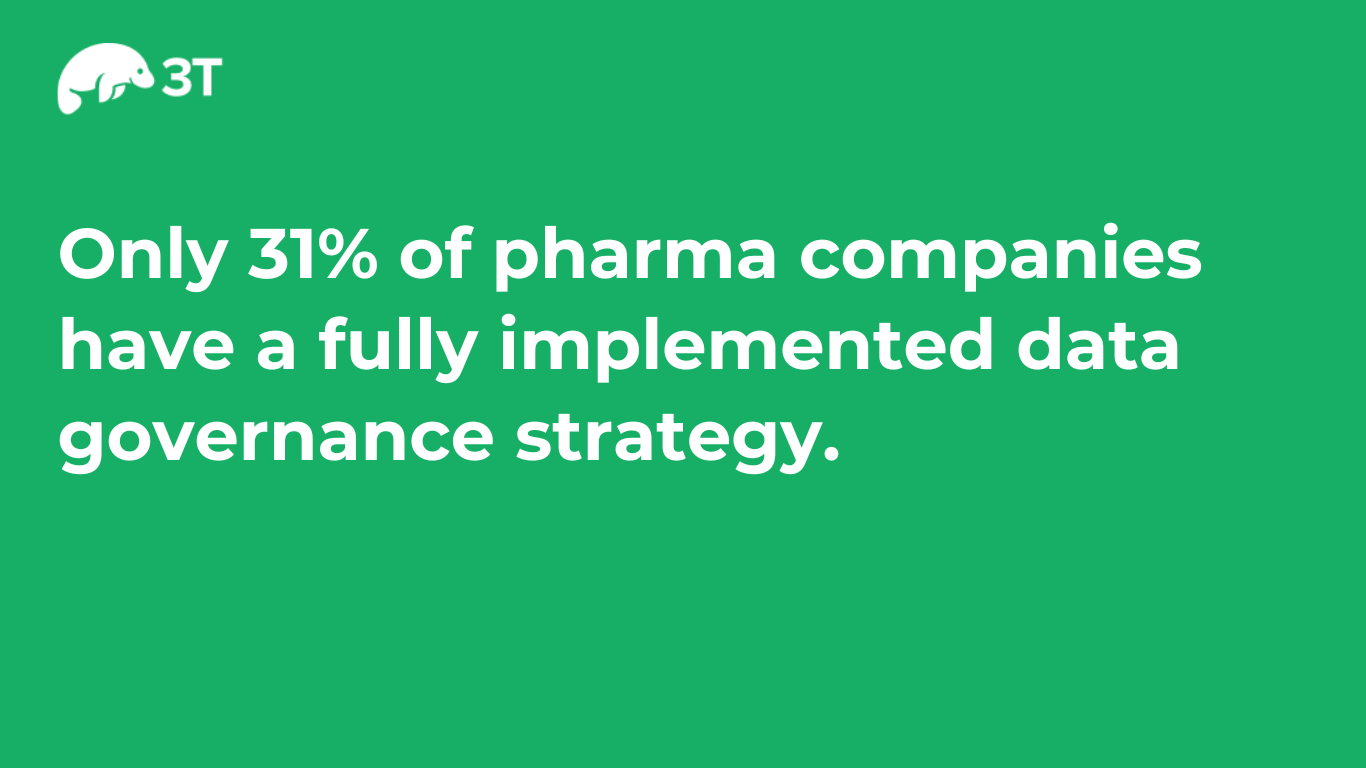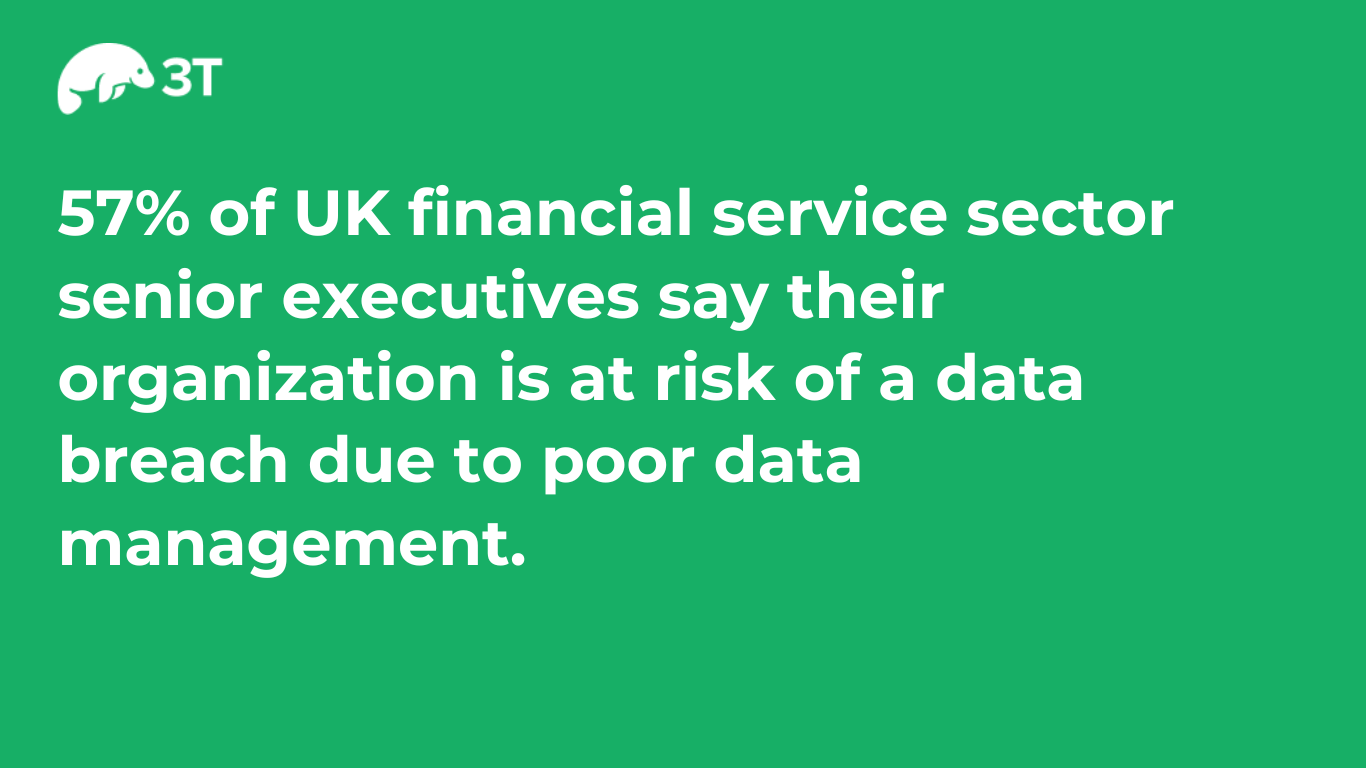Businesses in the pharmaceuticals and banking, financial services and insurance (BFSI) sectors should be well aware of the need for effective data governance.
These organizations manage a large amount of sensitive data, like patient records and financial information and are subject to a range of strict regulatory requirements. The consequences of failing to meet these can be disastrous from both a reputational and financial perspective.
Non-compliance with GDPR alone can cost companies up to €20M or 4% of revenue, further underlining the need for careful data management.
Yet, it seems more work needs to be done. A IQVIA survey found that only 31% of pharma companies have a fully implemented data governance strategy, which means almost 70% are relying on a partial strategy or none at all. Meanwhile, Cynozure research found 57% senior executives in the UK financial services sector say their organization is at risk of a data breach because of poor data management.
Many pharma and finance companies find MongoDB is well suited to their varied data needs. As a document database, MongoDB is able to handle the demands of modern, agile software development.
As a No SQL database it uses BSON (a binary format similar to JSON), which allows users to store both structured and unstructured data.
And with the right knowledge and tools, data governance and compliance can be made easier with MongoDB.
Why data governance matters for BFSI and pharma
BFSI:
GDPR, AML (Anti-Money Laundering), PCI DSS, and SOX compliance may all need to be considered by this sector. Key challenges include securing sensitive customer data, maintaining audit trails, and ensuring accountability.
Pharma:
From the U.S. Food and Drug Administration guidelines and those put in place by the UK’s Medicines and Healthcare products Regulatory Agency to HIPAA regulations and standards for clinical trial data integrity. The pharmaceutical industry is subject to strict regulation. Data privacy and accuracy in research and patient care is critical for pharma companies.
Both sectors also need protecting sensitive information and restricting data access to authorized personnel only. Detailed audit logs for accountability and transparency are important, as is an ability to manage large and growing datasets efficiently.

How to ensure data security with MongoDB
MongoDB’s document-based data model makes it a good choice for the changing data needs of BFSI and pharmaceutical companies.
The platform comfortably deals with huge datasets and high-throughput operations means organizations can scale without compromising performance. This is invaluable for industries like BFSI and pharmaceuticals, where new digital transactions, IoT devices, and research and development processes can see data volumes quickly increase.
MongoDB also provides built-in features like:
Encryption: This makes sure data is secured both in transit and at rest. In real terms, this means confidential customer or patient information, like financial transactions or clinical data, is protected from unauthorized access.
For BFSI companies, this level of encryption helps maintain customer trust and compliance with regulations like PCI DSS. For pharmaceutical companies, it ensures adherence to guidelines like HIPAA or GDPR, reducing the risk of penalties and reputational damage.
Auditing: MongoDB’s detailed audit logs help track user activity and changes. This clear visibility of database interactions, allows for easier investigations and operational transparency, which is good news for meeting a range of regulatory requirements.
Third-party tools to make data governance even easier
RBAC
MongoDB does not have a built-in feature for easily assigning roles to multiple users simultaneously. As users often have to rely on scripts or manual processes to grant roles to multiple users efficiently, this can be a pain point for MongoDB users.
We try not to blow our own trumpet too much, but Studio 3T allows you to easily grant roles to multiple users at once.
There’s also an intuitive interface for managing user roles and permissions. Instead of writing scripts or manually running commands, you can manage users and their roles interactively. This makes it easy to precisely control who can access, edit, or query specific datasets – good news for ensuring compliance with regulations like GDPR and HIPAA.
For example, a financial institution can restrict access to sensitive customer information to compliance officers while granting read-only permissions to analysts.
Schema management
With schema visualization and validation tools you can design, manage, and enforce consistent data structures, which is useful for compliance with industry standards.
Pharma companies can use schema validation to make sure clinical trial data is consistent and accurate across various stages of research.
Data masking
With a data masking tool you can copy and share data the compliant way. Obfuscating sensitive information ensures only anonymized data is shared during testing, development, or collaboration.
Whether it’s protecting patient data in pharmaceutical research or safeguarding financial information during software testing, this feature is essential.

Example use cases
Finance
A global bank complies with GDPR by implementing strict access controls, making sure customer data is only accessible to authorized personnel. Audit tools help maintain detailed logs of all data access and modifications, making compliance reporting a breeze.
Pharma
A pharmaceutical company uses data masking to anonymize patient records during collaborative research projects. This allows researchers to work with high-quality data, while also complying with HIPAA requirements.
Future-proofed data governance for BFSI and pharma
Data privacy laws change over time, so it’s important to have tools capable of helping you quickly adapt to any new compliance requirements. By setting yourself up for success with MongoDB’s flexible schema and powerful governance features you’re in a great position to deal with whatever the future holds.
AI is increasingly proving useful for compliance checks, detecting anomalies, and managing data lifecycles. So it’s worth making sure you’re equipped to take advantage of the technology.
Time to make a change?
As data governance is something every BFSI and pharmaceutical company needs to take seriously to maintain trust and compliance, it’s worth taking stock of your current situation.
By following data governance best practices in MongoDB, you will find your organization is able to secure sensitive information, and meet regulatory standards with confidence.








